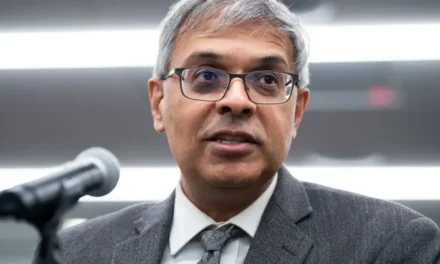We support our Publishers and Content Creators. You can view this story on their website by CLICKING HERE.

Texas Sen. Ted Cruz and some of his Republican colleagues recently
reintroduced legislation that would amend the U.S. Constitution to limit lawmakers from serving more than two six-year terms in the U.S. Senate or three two-year terms in the House of Representatives.
While the
Texas Tribune and other publications have eagerly pointed out that Cruz has exceeded his own proposed limit, the Republican senator has beat the drum for better turnover in Washington for years, first proposing a constitutional amendment to impose term limits in 2017.
After proposing the amendment again with former Rep. Francis Rooney (R-Fla.) in 2019 and with the backing of Republican Sens. Marco Rubio (Fla.) and Mike Lee (Utah) and former Sen. David Perdue (R-Ga.), Cruz
stated, “Term limits on members of Congress offer a solution to the brokenness we see in Washington, D.C. It is long past time for Congress to hold itself accountable.”
Later that year, Cruz
said when chairing a Senate Judiciary’s subcommittee on the Constitution hearing on term limits,
[In] the 2016 election, the American people made a resounding call to “drain the swamp” that is modern Washington. And sadly this is a bipartisan problem. The American people have lost confidence in Washington, and especially in Congress. It isn’t hard to see why. Enmeshed in backroom deals and broken promises, our capital has too often become a political playground for the powerful and the well-connected, for members of the permanent political class looking to accumulate more and more power at the expense of American taxpayers.
“Every year, Congress spends billions of dollars on giveaways for the well-connected. Washington insiders get taxpayer money; members of Congress get re-elected and the system works for everyone except the American people,” continued Cruz, who reintroduced his amendment in 2021 and 2023. “This kind of self-interest builds on itself as members spend more time in office. In an age in which partisan divide seem intractable, it is remarkable that public support for congressional term limits remains strong across party lines.”
The Center Square
reported that Rep. Ralph Norman (R-S.C.) introduced the companion resolution of the term limit legislation in the House, stating, “Those of us in Congress ought to serve for a reasonable period of time and then return home to live under the laws we enacted.”
There is overwhelming bipartisan support for term limits.
A Pew Research Center survey conducted in July 2023
found that 90% of Republicans and Republican-leaning independents and 86% of Democrats and Democratic leaners support limiting the number of terms that members of Congress can serve.
The survey also found that 79% of all respondents signaled support for a maximum age limit for elected officials in the nation’s capital.
‘Power is an elixir that is hard to put down.’
A January 2023 Congressional Research Service report
indicated that whereas during most of the 19th century, the average tenure of members of Congress remained steady, there was a dramatic increase in how long lawmakers spent in both the Senate and House of Representatives.
Whereas the prior House service of incoming Representatives was, on average, 2.5 years in the 19th century, the CRS indicated that has shot up to an average of 9.4 years in the 21st century. Meanwhile, incoming senators averaged 4.8 years of prior chamber service in the 19th century, whereas in the 21st century, that figure has risen to 11.2 years.
While term limits could potentially serve to prevent the solidification of a permanent ruling class in Washington, D.C., they could also spare the country from transforming further into a gerontocracy and spare the American people from rule by potentially medically compromised lawmakers.
Republican Sen. Chuck Grassley (Iowa), the longest-serving senator in the previous Congress and the oldest lawmaker in the Senate chamber who is set to finish his current term at the age of 95, was
briefly hospitalized in 2024.
Republican Sen. Mitch McConnell (Ky.), another geriatric lawmaker and the longest-serving Senate party leader in American history, has
similarly had health issues in recent months and years, freezing up when fielding questions, repeatedly tripping, and receiving treatment for a concussion.
The late Democratic Sen. Dianne Feinstein first took office in a 1992 special election and was re-elected five times. Despite
clear signs of mental deterioration — signaling at times she didn’t know where she was going or where she had been — her aides and allies kept wheeling her into the Senate and allegedly telling her how to cast votes.
A Pentagon-funded study
highlighted in 2023 how elderly government officials’ mental degradation could pose significant risks to national and global security.
The RAND Corporation’s National Security Research Division indicated that as a consequence of people living longer and working later in life, “The workforce might experience a higher prevalence of dementia than in past generations.”
“Taken together, we believe that an increasing number of cleared personnel — that is, personnel who hold or have held security clearances — have or will have dementia,” concluded the RAND researchers.
Return managing editor Peter Gietl previously
noted in a piece on America’s “octogenarian oligarchy” that “our present-day leadership seem to have no interest in enjoying their golden years with their families, spending the hundreds of millions they’ve accumulated. Power is an elixir that is hard to put down.”
Cruz’s proposed constitutional amendment will require a two-thirds majority vote both in the U.S. House and Senate.
Like Blaze News? Bypass the censors, sign up for our newsletters, and get stories like this direct to your inbox. Sign up here!

 Conservative
Conservative  Search
Search Trending
Trending Current News
Current News 







